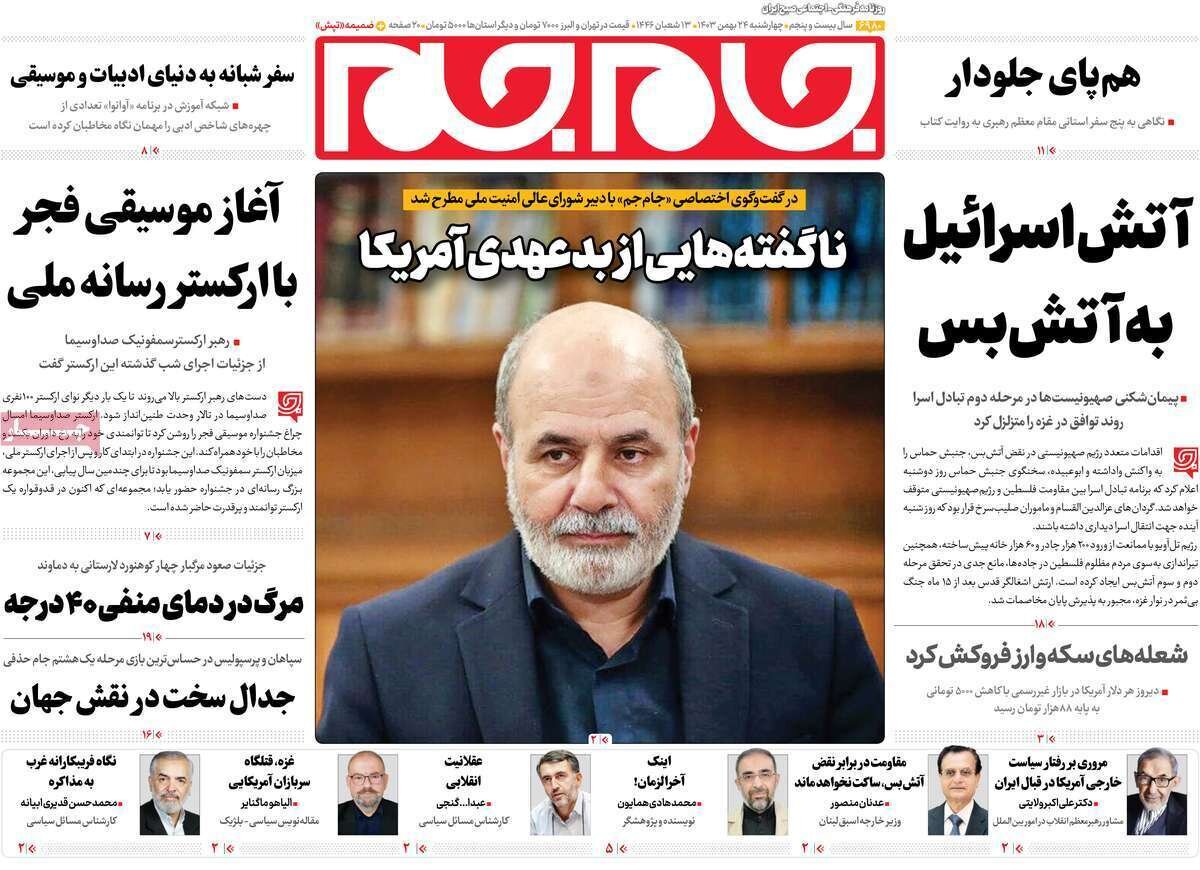Maximum participation in the face of maximum pressure
‘Maximum’ participation in the face of maximum pressure
TEHRAN - In a note, Jam-e-Jam addressed the enthusiastic presence of the people in Bahman 22 (11 February) rallies and wrote: One of the most important points of this year's rally was its coincidence with Trump and the declaration of the White House's anti-Iran policies.

In recent days, Washington has tried to force the Islamic Republic of Iran to accept its conditions through new sanctions and diplomatic pressure, but the enthusiastic participation of people in the Bahman 22 marches proved that the Iranian people not only do not give in to pressure but also defend their country's strategic policies. The Iranians have shown that maximum pressure will only lead to one reaction: maximum presence on the scene. Extensive U.S. sanctions and threatening rhetoric are nothing new but the 22 Bahman (11 February) rallies were the culmination of the powerful participation of these brave people and a symbol of national solidarity against the conspiracies of the enemies. The Iranian people have shown that they will not surrender to America’s excesses, especially in the area of defense power and regional influence. The experience of the past years has proven that whenever external pressures increase, unity and internal resistance also increase.
Shargh: Iran needs continued stability in Iraq
In a commentary, Shargh discussed the importance of Iraq in Iran’s confrontation with the United States and said: Prime Minister Shia al-Sudani is aware that Iraq is Iran’s last powerful base for influence in the region, which Tehran can use to evade Western sanctions. Iraq has a set of armed groups that can play the role of “front defense” for Iran in the event of a full-scale attack on the Islamic Republic. Similarly, Iran also needs continued stability in Iraq, and from Iran’s point of view, Sudani is probably the best tool to maintain the balance between Tehran and Washington. The Trump administration may intensify sanctions against Iraq by sanctioning some officials in Iraqi financial institutions that help Iran evade U.S. sanctions. The tightening of sanctions disrupts the existing equation between the U.S. and Iran and weakens the Sudani government. Sudani's balancing act has become more difficult due to the weak position of the Iraqi government and the inability of the prime minister to confront groups that are members of the Iraqi Islamic Resistance.
Iran: Trump's anti-Iran dreams
The Iran newspaper has highlighted Masoud Pezeshkian's reaction to Trump's policy of returning to maximum pressure against Iran and at the same time paying close attention to fulfilling his foreign policy promises. Pezeshkian announced that he would not surrender to America's policy of simultaneous pressure and negotiation, emphasizing that his government's approach to reducing crises is to prevent the repetition of Washington’s harmful sanctions. On one side, Trump wants to intensify sanctions in line with his maximum pressure campaign adopted in his first term from 2017-2021, and on the other showing support for negotiations. Despite all the experiences that Iran and the United States have gone through during Trump's first term as president, it shows that when the circumstances require it, Tehran can use all its power to break the deadlock, invalidate military threats, and organize a new wave of resistance to sanctions to prevent Trump from achieving his goals.
Ettelaat: Past losses will not be compensated
Ettelaat discussed the FATF issue in an interview with Heshmatollah Falahatpisheh, a former parliamentarian. He said: If Iran had not been blacklisted in the past, there would have been no possibility of FATF serving as a vehicle for sanctions against Iran. But now Iran is on the blacklist, and other banks of countries cannot work with us either. This was an opportunity that was lost due to extremists’ intransigence at the of national interests. The United States, Europe, and other actors are facing problems with Iran over preconditions. the United States has returned with a policy of maximum pressure, Israel has a role to play, and European countries are taking a tough stance toward us. In this situation, if FATF is approved with the previous preconditions, serious obstacles will arise in Iran's path to be removed from the blacklist. Therefore, the most important thing to do regarding the FATF is to prepare an accurate report in line with national interests.
source: tehrantimes.com